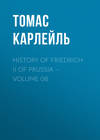Loe raamatut: «History of Friedrich II of Prussia — Volume 18», lehekülg 26
"The place is still partly of Wendish speech; the Parson has to preach one half of the Sunday in Wend, the other in German. Among the Hills to south," well worth noting at present, "is one called CZARNABOG, or 'Devil's Hill;' where the Wendish Devil and his Witches (equal to any German on his Blocksberg, or preternatural Bracken of the Harz) hold their annual WITCHES'-SABBATH,—a thing not to be contemplated without a shudder by the Wendish mind. Thereabouts, and close from Hochkirch southward, all is shadowy intricacy of thicket and wild wood. Northward too from Hochkirch, and all about, I perceive the scene was woodier then than now;—and must have looked picturesque enough (had anybody been in quest of that), with the multifarious uniforms, and tented people sprinkled far and wide among the leafy red-and-yellow of October, 1758." [Tourist's Note, September, 1858.]
In the Village of Wuischke, precisely at the northern base of that shaggy Czarnabog or Devil's Hill, stand Loudon and 3,000 Croats and grenadiers, as the extreme left of Daun's position. Wuischke is nearly straight south of Hochkirch; so far westward has Loudon pushed forward with his Croats, hidden among the Hills; though Daun's general position lies a good mile to east of Friedrich's:—irregularly north and south, both Friedrich and Daun; the former ignorant what Croats and Loudonries, there may be among those Devil's Hills to his right; the latter not ignorant. Friedrich's right wing, Keith in command of it, stretches to Hochkirch and a little farther: beyond Hochkirch, it has Four flank Battalions in potence form, with proper vedettes and pickets; and above all, with a strong Battery of Twenty Guns, which it maintains on the next Height immediately adjoining Hochkirch, and perceptibly higher than Hochkirch. This is the finis of Keith on his right; and—except those vedettes, and pickets of Free-corps people, thrown out a little way ahead into the bushes, on that side—Friedrich's right wing knows nothing of the shaggy elevations horrent with wood, which lie to southward; and merely intends to play its Twenty Cannon upon them, should they give birth to anything. This is Friedrich's posture on his right or south wing.
From Hochkirch northward or nearly so, but sprinkled about in all the villages and points of strength, as far up as Drehsa and beyond Drehsa, to near Kotitz, a less important village, Friedrich extends about four miles; centre at Rodewitz, where his own head-quarter is, above two miles north of Hochkirch. Not far from Rodewitz, but a little to left and ahead, stands his second and best Battery, of Thirty Guns; ready to play upon Lauska, a poor village, and its roadway, should the Austrians try anything there, or from their Stromberg post, which is a good mile behind Lauska. His strength, in these lines, some count to be only 28,000, or less. Four or five miles to northeast, in and behind Weissenberg (which we used to know last summer), lies Retzow, with perhaps 10 or 12,000, which will bring him up to 40,000, were they properly joined with him as a left wing. Daun's force counts 90,000; with Friedrich lying under his nose in this insolent manner.
Daun's head-quarter, as we said, is Kittlitz; a Village some two miles short of Lobau, in the direction southeast of Friedrich; perhaps five miles to southeast of Rodewitz, Friedrich's lodging. It is close upon the Bautzen-Zittau Highway; Zittau some twenty miles to south of it, Herrnhuth and the pacific Brethren about half-way thither. Kittlitz lies more to south than Hochkirch itself; and Daun's outposts, as we saw, circle quite round among those Devil's Hills, and envelop Friedrich's right flank. But Daun's main force lies chiefly northward, and well to west, of Kittlitz; parallel to Friedrich, and eastward of him; with elaborate intrenchments; every village, brook, bridge, height and bit of good ground, Stromberg to end with, punctually secured. Obliquely over the Stromberg, holding the Stromberg and certain Villages to southeast and to northwest of it, lies D'Ahremberg, as right wing: about 20,000 he, put into oblique potence; looking into Kotitz, which is Friedrich's extreme left; and in a good measure dividing Friedrich from the Retzow 10,000. And lastly, as reserve, in front of Reichenbach, eight or nine miles to east of all that, lies the Prince of Baden-Durlach, 25,000 or so; barring Retzow on that side, and all attempts on the Silesian Road there. Daun's lines, not counting in the southern outposts or Devil's-Hill parties, are considerably longer than Friedrich's, and also considerably deeper. The two head-quarters are about five miles apart: but the two fronts—divided by a brook and good hollow running here (one of many such, making all for Lobau Water)—are not half a mile apart. Towards Hochkirch and the top of this brook, the opposing posts are quite crammed close on one another; divided only by their hollow. Many brooks, each with a definite hollow, run tinkling about here, swift but straitened to get out; especially Lobau Water, which receives them all, has to take a quite meandering circling course (through Daun's quarters and beyond them) before it can disembogue in Spree, and decidedly set out for Berlin under that new name. The Landscape—seen from Hochkirch Village, still better from the Church-steeple which lifts you high above it, and commands all round except to the south, where Friedrich's battery-height quite shuts you in, and hides even those Devil's Hills beyond—is cheerful and pretty. Village belfries, steeples and towers; airy green ridges of heights, and intricate greener valleys: now rather barer than you like. The Tourist tells me, in Friedrich's time there must have been a great deal more of wood than now.
WHAT ACTUALLY BEFELL AT HOCHKIRCH (Saturday, 14th October, 1758)
Friedrich, for some time,—probably ever since Wednesday morning, when he found the Stromberg was not to be his,—had decided to be out of this bad post. In which, clearly enough, nothing was to be done, unless Daun would attempt something else than more and more intrenching and palisading himself. Friedrich on the second day (Thursday, 12th) rode across to Weissenberg, to give Retzow his directions, and take view of the ground: "Saturday night, Herr Retzow, sooner it cannot be [Friedrich had aimed at Friday night, but finds the Provision-convoy cannot possibly be up]; Saturday night, in all silence, we sweep round out of this,—we and you;—hurl Baden-Durlach about his business; and are at Schops and Reichenbach, and the Silesian Highway open, next morning, to us!" [Tempelhof, ii. 320.] Quietly everything is speeding on towards this consummation, on Friedrich's part. But on Daun's part there is—started, I should guess, on the very same Thursday—another consummation getting ready, which is to fall out on Saturday MORNING, fifteen hours before that other, and entirely supersede that other!—
Keith's opinion, that the Austrians deserve to be hanged if they don't attack us here, is also Loudon's opinion and Lacy's, and indeed everybody's,—and at length Daun's own; who determines to try something here, if never before or after. This plan, all judges admit, was elaborate and good; and was well executed too,—Daun himself presiding over the most critical part of the execution. A plan to have ruined almost any Army, except this Prussian one and the Captain it chanced to have. A universal camisado, or surprisal of Friedrich in his Camp, before daylight: everybody knows that it took effect (Hochkirch, Saturday, 14th October, 1758, 5 A.M. of a misty morning); nobody expects of an unassisted fellow-creature much light on so doubly dark a thing. But the truth is, there are ample accounts, exact, though very chaotic; and the thing, steadily examined, till its essential features extricate themselves from the unessential, proves to be not quite so unintelligible, and nothing like so destructive, overwhelming and ruinous as was supposed.
Daun's plan is very elaborate, and includes a great many combinations; all his 90,000 to come into it, simultaneously or in succession. But the first and grandly vital part, mainspring and father to all the rest, is this: That Daun, in person, after nightfall of Friday, shall, with the pick of his force, say 30,000 horse and foot, with all their artilleries and tools, silently quit his now position in front of Hochkirch, Friedrich's right wing. Shall sweep off, silently to southward and leftward, by Wuischke; thence westward and northward, by the northern base of those Devil Mountains, through the shaggy hollows and thick woods there, hitherto inhabited by Croats only, and unknown to the Prussians: forward, ever forward, through the night-watches that way; till he has fairly got to the flank of Hochkirch and Friedrich: Daun to be standing there, all round from the southern environs of Hochkirch, westward through the Woods, by Meschwitz, Steindorfel, and even north to Waditz (if readers will consult their Map), silently enclosing Friedrich, as in the bag of a net, in this manner;—ready every man and gun by about four on Saturday morning. Are to wait for the stroke of five in Hochkirch steeple; and there and then to begin business,—there first; but, on success THERE, the whole 90,000 everywhere,—and to draw the strings on Friedrich, and bag and strangle his astonished people and him.
The difficulty has been to keep it perfectly secret from so vigilant a man as Friedrich: but Daun has completely succeeded. Perhaps Friedrich's eyes have been a little dimmed by contempt of Daun: Daun, for the last two days especially, has been more diligent than ever to palisade himself on every point; nothing, seemingly, on hand but felling woods, building abatis, against some dangerous Lion's-spring. They say also, he detected a traitor in his camp; traitor carrying Letters to Friedrich under pretence of fresh eggs,—one of the eggs blown, and a Note of Daun's Procedures substituted as yolk. "You are dead, sirrah," said Daun; "hoisted to the highest gallows: Are not you? But put in a Note of my dictating, and your beggarly life is saved." Retzow Junior, though there is no evidence except of the circumstantial kind, thinks this current story may be true. [Retzow, i. 347.] Certain it is, neither Friedrich nor any of his people had the least suspicion of Daun's project, till the moment it exploded on them, when the clock at Hochkirch struck five. Daun, in the last two days, had been felling even more trees than they are aware of,—thousands of trees in those Devil's wildernesses to Friedrich's right; and has secretly hewn himself roads, passable by night for men and ammunition-wagons there:—and in front of Friedrich, especially Hochkirch way, Daun seems busier than ever felling wood, this Friday night; numbers of people running about with axes, with lanterns over there, as if in the push of hurry, and making a great deal of noise. "Intending retreat for Zittau to-morrow!" thinks Friedrich, as the false egg-yolk had taught him; or merely, "That poor precautionary fellow!" supposing the false yolk a myth. In short, Daun has got through his nocturnal wildernesses with perfect success. And stands, dreamt of by no enemy, in the places appointed for his 30,000 and him; and that poor old clock of Hochkirch, unweariedly grunting forward to the stroke of five, will strike up something it is little expecting!—
The Prussians have vedettes, pickets and small outposts of Free-corps people scattered about within their border of that Austrian Wood, the body of which, about Hochkirch as everywhere else, belongs wholly to Croats. Of course there are guard-parties, sentries duly vigilant, in the big Battery to southeast of Hochkirch,—and along southwestward in that POTENCE, or fore-arm of Four Battalions, which are stationed there. Four good Battalions looking southward there, with Cavalry to right; Ziethen's Cavalry,—whose horses stand saddled through the night, ready always for the nocturnal "Pandourade," which seldom fails them. There, as elsewhere, are the due vigilances, watchmen, watch-fires. The rest of the Prussian Army is in its blankets, wholly asleep, while Daun stands waiting for the stroke of five.
That Daun, bursting in with his chosen 30,000, will trample down the sleeping Prussian POTENCE at Hochkirch; capture its big Battery to left, its Village of Hochkirch to rear, and do extensive ruin on the whole right wing of Friedrich; rendering Friedrich everywhere an easy conquest to the rest of Daun's people, who stand, far and wide, duly posted and prepared, waiting only their signal from Hochkirch: much of this, all of it that had regard to Hochkirch Battery and Village, and the Prussians stationed there, Daun did execute. And readers, from the data they have got, must conceive the manner of it,—human description of the next Two Hours, about Hochkirch, in the thick darkness there, and stormful sudden inroad, and stormful resistance made, being manifestly an impossible thing. Nobody was "massacred in his bed" as the sympathetic gazetteers fancied; nobody was killed, that I hear of, without arms, in his hand: but plenty of people perished, fierce of humor, on both sides; and from half-past five till towards eight, there was a general blaze of fiery chaos pushing out ever and anon, swallowed in the belly of Night again, such as was seldom seen in this world. Instead of confused details, and wearisome enumeration of particulars, which nobody would listen to or understand, we will give one intelligent young gentleman's experience, our friend Tempelhof's, who stood in this part of the Prussian Line; experience distinct and indubitable to us; and which was pretty accurately symbolical, I otherwise see, of what befell on all points thereabouts. Faithfully copied, and in the essential parts not even abridged, here it is:—
Tempelhof, at that time a subaltern of artillery, was stationed with a couple of 24-pounders in attendance on the Battalion Plothow, which with three others and some cavalry lay to the south side of Hochkirch, forming a kind of fore-arm or POTENCE there to right of the big Battery, with their rear to Hochkirch; and keeping vedettes and Free-corps parties spread out into the woods and Devil's Hills ahead. Tempelhof had risen about three, as usual; had his guns and gunners ready; and was standing by the watch-fire, "expecting the customary Pandourade," and what form it would take this morning. "Close on five o'clock; and not a mouse stirring! We are not to have our Pandourade, then?" On a sudden, noise bursts out; noise enough, sharp fire among the Free-corps people; fire growing ever sharper, noisier, for the next half-hour, but nothing whatever to be seen. "Battalion Plothow had soon got its clothes on, all to the spatterdashes; and took rank to right and left of the FLECHE, and of my two guns, in front of its post: but on account of the thick fog everything was totally dark. I fired off my cannons [shall we say straight southward?] to learn whether there was anything in front of us. No answer: 'Nothing there—Pshaw, a mere crackery (GEKNACKER) of Pandours and our Free-corps people, after all!' But the noise grew louder, and came ever nearer; I turned my guns towards it [southward, southeastward, or perhaps a gun each way?]—and here we had a salvo in response, from some battalions who seemed to be two hundred yards or so ahead. The Battalion Plothow hereupon gave fire; I too plied my cannons what I could,—and had perhaps delivered fifteen double shots from them, when at once I tumbled to the ground, and lost all consciousness" for some minutes or moments.
Awakening with the blood running down his face, poor Tempelhof concluded it had been a musket-shot in the head; but on getting to his hands and knees, he found the place "full of Austrian grenadiers, who had crept in through our tents to rear; and that it had been a knock with the butt of the musket from one of those fellows, and not a bullet" that had struck him down. Battalion Plothow, assailed on all sides, resisted on all sides; and Tempelhof saw from the ground,—I suppose, by the embers of watch-fires, and by rare flashes of musketry, for they did not fire much, having no room, but smashed and stabbed and cut,—"an infantry fight which in murderous intensity surpasses imagination. I was taken prisoner at this turn; but soon after got delivered by our cavalry again." [Tempelhof, ii. 324 n.]
This latter circumstance, of being delivered by the Cavalry, I find to be of frequent occurrence in that first act of the business there: the Prussian Battalion, surprised on front and rear, always makes murderous fight for itself: is at last overwhelmed, obliged to retire, perhaps opening its way by bayonet charge;—upon which our Cavalry (Ziethen's, and others that gathered to him) cutting in upon the disordered surprisers, cut them into flight, rescue the prisoners, and for a time reinstate matters. The Prussian battalions do not run (nobody runs); but when repulsed by the endless odds, rally again. The big Battery is not to be had of them without fierce and dogged struggle; and is retaken more than once or twice. Still fiercer, more dogged, was the struggle in Hochkirch Village; especially in Hochkirch Church and Churchyard,—whither the Battalion Margraf-Karl had flung themselves; the poor Village soon taking fire about them. Soon taking fire, and continuing to be a scene of capture and recapture, by the flame-light; while Battalion Margraf-Karl stood with invincible stubbornness, pouring death from it; not to be compulsed by the raging tide of Austrian grenadiers; not by "six Austrian battalions," by "eight," or by never so many. Stood at bay there; levelling whole masses of them,—till its cartridges were spent, all to one or two per man; and Major Lange, the heroic Captain of it, said, "We shall have to go, then, my men; let us cut ourselves through!"—and did so, in an honorably invincible manner; some brave remnant actually getting through, with Lange himself wounded to death.
I think it was not till towards six o'clock that the right wing generally became aware what the case was: "More than a Pandourade, yes;"—though what it might be, in the thick fog which had fallen, blotting out all vestiges of daylight, nobody could well say. Rallied Battalions, reinforced by this or the other Battalion hurrying up from leftward, always charge in upon the enemy, in Hochkirch or wherever he is busy; generally push him back into the Night; but are then fallen upon on both flanks by endless new strength, and obliged to draw back in turn. And Ziethen's Horse, in the mean while, do execution; breaking in on the tumultuous victors; new Cuirassiers, Gens-d'Armes dashing up to help, so soon as saddled, and charging with a will: so that, on the whole, the enemy, variously attempting, could make nothing of us on that western, or rearward side,—thanks mainly to Ziethen and the Horse. "Had we but waited till three or four of our Battalions had got up!" say the Prussian narrators. But it is thick mist; few yards ahead you cannot see at all, unless it be flame; and close at hand, all things and figures waver indistinct,—hairy outlines of blacker shadows on a ground of black.
It must have been while Lange was still fighting, perhaps before Lange took to the Church of Hochkirch, scarcely later than half-past six (but nobody thought of pulling out his watch in such a business!)—about six, or half-past six, when Keith, who has charge of this wing, and lodges somewhere below or north of Hochkirch, came to understand that his big Battery was taken; that here was such a Pandourade as had not been before; and that, of a surety, said Battery must be retaken. Keith springs on horseback; hastily takes "Battalion Kannacker" and several remnants of others; rushes upwards, "leaving Hochkirch a little to right; direct upon the big Battery." Recaptures the big Battery. But is set upon by overwhelming multitudes, bent to have it back;—is passionate for new assistance in this vital point; but can get none: had been "DISARTED by both his Aide-de-camps," says poor John Tebay, a wandering English horse-soldier, who attends him as mounted groom; "asked twenty times, and twenty more, 'Where are my Aide-de-camps!'" ["Captens Cockcey and Goudy" he calls them—(COCCEJI whose Father the Kanzler we have seen, and GAUDI whose self),—who both had, in succession, struck into Hochkirch as the less desperate place, according to Tebay: see TEBAY'S LETTER to Mitchell, "Crossen, October 29th" (in MEMOIRS AND PAPERS, ii. 501-505);—which is probably true every word, allowing for Tebay's temper; but is highly indecipherable, though not entirely so after many readings and researehings.]—but could get no response or reinforcement; and at length, quite surrounded and overwhelmed, had to retire; opening his way by the bayonet; and before long, suddenly stopping short,—falling dead into Tebay's arms; shot through the heart. Two shots on the right side he had not regarded; but this on the left side was final: Keith's fightings are suddenly all done. Tebay, in distraction, tried much to bring away the body; but could by no present means; distractedly "rid for a coach;" found, on return, that the Austrians had the ground, and the body of his master; Hochkirch, Church and all, now undisputedly theirs.
To appearance, it was this news of Keith's repulse (I know not whether of Keith's DEATH as yet) that first roused Friedrich to a full sense of what was now going on, two miles to south of him. Friedrich, according to his habits, must have been awake and afoot when the Business first broke out; though, for some considerable time, treating it as nothing but a common crackery of Pandours. Already, finding the Pandourade louder than usual, he had ordered out to it one battalion and the other that lay handy: but now he pushes forward several battalions under Franz of Brunswick (his youngest Brother-in-law), with Margraf Karl and Prince Moritz: "Swift you, to Hochkirch yonder!"—and himself springs on horseback to deal with the affair. Prince Franz of Brunswick, poor young fellow, cheerily coming on, near Hochkirch had his head shorn off by a cannon-ball. Moritz of Dessau, too, "riding within twenty yards of the Austrians," so dark was it, he so near-sighted, got badly hit,—and soon after, driving to Bautzen for surgery, was made prisoner by Pandours; [In ARCHENHOLTZ (i. 289, 290) his dangerous adventures on the road to Bautzen, in this wounded condition.] never fought again, "died next year of cancer in the lip." Nothing but triumphant Austrian shot and cannon-shot going yonder; these battalions too have to fall back with sore loss.
Friedrich himself, by this time, is forward in the thick of the tumult, with another body of battalions; storming furiously along, has his horse shot under him; storms through, "successfully, by the other side of Hochkirch" (Hochkirch to his left):—but finds, as the mist gradually sinks, a ring of Austrians massed ahead, on the
—MAP GOES HERE, FACING PAGE 160, BOOK XVIII———
Heights; as far as Steindorfel and farther, a general continent of Austrians enclosing all the south and southwest; and, in fact, that here is now nothing to be done. That the question of his flank is settled; that the question now is of his front, which the appointed Austrian parties are now upon attacking. Question especially of the Heights of Drehsa, and of the Pass and Brook of Drehsa (rearward of his centre part), where his one retreat will lie, Steindorfel being now lost. Part first of the Affair is ended; Part second of it begins.
Rapidly enough Friedrich takes his new measures. Seizes Drehsa Height, which will now be key of the field; despatches Mollendorf thither (Mollendorf our courageous Leuthen friend); who vigorously bestirs himself; gets hold of Drehsa Height before the enemy can; Ziethen co-operating on the Heights of Kumschutz, Canitz and other points of vantage. And thus, in effect, Friedrich pulls up his torn right skirt (as he is doing all his other skirts) into new compact front against the Austrians: so that, in that southwestern part especially; the Austrians do not try it farther; but "retire at full gallop," on sight of this swift seizure of the Keys by Mollendorf and Ziethen. Friedrich also despatches instant order to Retzow, to join him at his speediest. Friedrich everywhere rearranges himself, hither, thither, with skilful rapidity, in new Line of Battle; still hopeful to dispute what is left of the field;—longing much that Retzow could come on wings.
By this time (towards eight, if I might guess) Day has got the upper hand; the Daun Austrians stand visible on their Ring of Heights all round, behind Hochkirch and our late Battery, on to westward and northward, as far as Steindorfel and Waditz;—extremely busy rearranging themselves into something of line; there being much confusion, much simmering about in clumps and gaps, after such a tussle. In front of us, to eastward, the appointed Austrian parties are proceeding to attack: but in daylight, and with our eyes open, it is a thing of difficulty, and does not prosper as Hochkirch did. Duke D'Ahremberg, on their extreme right, had in charge to burst in upon our left, so soon as he saw Hochkirch done: D'Ahremberg does try; as do others in their places, near Daun; but with comparatively little success. D'Ahremberg, meeting something of check or hindrance where he tried, pauses, for a good while, till he see how others prosper. Their grand chance is their superiority of number; and the fact that Friedrich can try nothing upon THEM, but must stand painfully on the defensive till Retzow come. To Friedrich, Retzow seems hugely slow about it. But the truth is, Baden-Durlach, with his 20,000 of Reserve, has, as per order, made attack on Retzow, 20,000 against 12: one of the feeblest attacks conceivable; but sufficient to detain Retzow till he get it repulsed. Retzow is diligent as Time, and will be here.
Meanwhile, the Austrians on front do, in a sporadic way, attack and again attack our batteries and posts; especially that big Battery of Thirty Guns, which we have to north of Rodewitz. The Austrians do take that Battery at last; and are beginning again to be dangerous,—the rather as D'Ahremberg seems again to be thinking of business. It is high time Retzow were here! Few sights could be gladder to Friedrich, than the first glitter of Retzow's vanguard,—horse, under Prince Eugen of Wurtemberg,—beautifully wending down from Weissenberg yonder; skilfully posting themselves, at Belgern and elsewhere, as thorns in the sides of D'Ahremberg (sharp enough, on trial by D'Ahremberg). Followed, before long, by Retzow himself; serenely crossing Lobau Water; and, with great celerity, and the best of skill, likewise posting himself,—hopelessly to D'Ahremberg, who tries nothing farther. The sun is now shining; it is now ten of the day. Had Retzow come an hour sooner;—efore we lost that big Battery and other things! But he could come no sooner; be thankful he is here at last, in such an overawing manner.
Friedrich, judging that nothing now can be made of the affair, orders retreat. Retreat, which had been getting schemed, I suppose, and planned in the gloom of the royal mind, ever since loss of that big Battery at Rodewitz. Little to occupy him, in this interim; except indignant waiting, rigorously steady, and some languid interchange of cannon-shot between the parties. Retreat is to Klein-Bautzen neighborhood (new head-quarter Doberschutz, outposts Kreckwitz and Purschwitz); four miles or so to northwest. Rather a shifting of your ground, which astonishes the military reader ever since, than a retreating such as the common run of us expected. Done in the usual masterly manner; part after part mending off, Retzow standing minatory here, Mollendorf minatory there, in the softest quasi-rhythmic sequence; Cavalry all drawn out between Belgern and Kreckwitz, baggage-wagons filing through the Pass of Drehsa;—not an Austrian meddling with it, less or more; Daun and his Austrians standing in their ring of five miles, gazing into it like stone statues; their regiments being still in a confused state,—and their Daun an extremely slow gentleman. [Tempelhof, ii. 319-336; Seyfarth, Beylagen, i. 432-453; Helden-Geschichte, v. 241-257; Archenholtz, &c. &c.]
And in this manner Friedrich, like a careless swimmer caught in the Mahlstrom, has not got swallowed in it; but has made such a buffeting of it, he is here out of it again, without bone broken,—not, we hope, without instruction from the adventure. He has lost 101 pieces of cannon, most of his tents and camp-furniture; and, what is more irreparable, above 8,000 of his brave people, 5,381 of them and 119 Officers (Keith and Moritz for two) either dead or captive. In men the Austrian loss, it seems, is not much lower, some say is rather a shade higher; by their own account, 325 Officers, 5,614 rank and file, killed and wounded,—not reckoning 1,000 prisoners they lost to us, and "at least 2,000" who took that chance of deserting in the intricate dark woods. [Tempelhof, ii. 336; but see Kausler, p. 576.]
Friedrich, all say, took his punishment in a wonderfully cheerful manner. De Catt the Reader, entering to him that evening as usual, the King advanced, in a tragic declamatory attitude; and gave him, with proper voice and gesture, an appropriate passage of Racine:—
"Enfin apres un an, tu me revois, Arbate,
Non plus comme autrefois cet heureux Mithridate,
Qui, de Rome toujours balancant le destin,
Tenait entre elle et moi l'univers incertain.
Je suis vaincu; Pompee a saisi l'avantage
D'une nuit qui laissait peu de place au courage;
Mes soldats presque nus, dans"...
Not a little to De Catt's comfort. [Rodenbeck, i. 354.] During the retreat itself, Retzow Junior had come, as Papa's Aide-de-Camp, with a message to the King; found him on the heights of Klein Bautzen, watching the movements. Message done with, the King said, in a smiling tone, "Daun has played me a slippery trick to-day!" "I have seen it," answered Retzow; "but it is only a scratch, which your Majesty will soon manage to heal again."—"GLAUBT ER DIES, Do you think so?" "Not only I, but the whole Army firmly believe it of your Majesty."—"You are quite right," added the King, in a confidentially candid way: "We will manage Daun. What I lament is, the number of brave men that have died this morning." [Retzow, i. 359 n.] On the morrow, he was heard to say publicly: "Daun has let us out of check-mate; the game is not lost yet. We will rest ourselves here, a few days; then go for Silesia, and deliver Neisse." The Anecdote-Books (perhaps not mythically) add this: "Where are all your guns, though?" said the King to an Artilleryman, standing vacant on parade, next day. "IHRO MAJESTAT, the Devil stole them all, last night!"—"Hm, well, we must have them back from him." [Archenholtz, i. 299.]




















